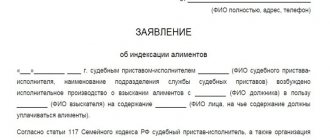The amount of money that can be claimed as alimony in a civil marriage
Alimony in a civil marriage is paid in the same amount and in the same manner as in an official marriage. A parent who does not live with the child is obliged to give part of the income for maintenance to the one raising the minor. The legislation of the Russian Federation in a standard situation establishes the amount of alimony as a share of earnings. It is important to clarify that earnings mean not only wages at the official place of work, but also any other income.
Alimony in a civil marriage is paid in the same amount and manner as in an official marriage.
This may include income from the rental of movable and immovable property, wages from a second place of work, interest on deposits in credit institutions.
The part of the funds that must be paid for the maintenance of children depends on the number of children in the family. According to the law, at least a quarter of earnings is deducted for one child, a third for supporting two, and half of all material income if there are three or more children.
The Family Code of the Russian Federation provides for the possibility of deviating from the shared rule for calculating alimony. The ex-husband and wife can agree that alimony will be paid in hard cash terms. Such a decision can be made by the court without the consent of one of the parents. The reasons may be:
- lack of a permanent official source of income for the parent who financially provides for the child;
- receipt by the parent of income in foreign currency;
- the desire of the child support payer to spend more money on the child;
- other reasons, if they most fully meet the interests of the minor.
Issues of alimony payment and child support after a divorce are always resolved in court.
Issues of alimony payment and child support after a divorce directly concern the interests of the child and therefore, in accordance with the legislation of the Russian Federation, are always resolved in court.
How much can you expect?
The amount of alimony for a spouse is not fixed, it depends on the individual conditions of each individual case. The court assigns alimony at its discretion, having examined all the documents provided by the plaintiff. The maintenance is assigned in a fixed amount. Data that the court takes into account when determining the amount of payments:
- the amount of income of both parties;
- stability of employment and income;
- the presence of expensive expenses: loans, maintenance of dependent relatives, expensive treatment, etc.);
- other individual conditions that affect the financial situation of the parties.
When determining the amount, the court is based on the cost of living in the region.
After the court decision is issued, the payer can challenge the amount of alimony if it seems unaffordable to him. By providing evidence of real income to the court, you can achieve a reduction in the amount of payments.
Features of receiving alimony in the absence of a registered relationship between parents
As noted above, the amount of alimony does not depend on whether the relationship between the parents is registered or not. The procedure for resolving disputes is similar in both cases; issues of alimony payments are almost always resolved through the courts. Even if the parents themselves agree on how the responsibilities for raising and maintaining minors will be distributed, the decision must be confirmed in court.
This is done to protect the interests of both the child and the child support payer. If maintenance money is given unofficially, then the parent with whom the child lives may subsequently file a claim for alimony. Over the course of several years, a very large amount of debt usually accumulates.
But if the child’s parents are not in a registered relationship, then the procedure for processing child support payments becomes more complicated. First of all, this is due to the need to establish paternity. But it is possible and necessary to receive alimony from your common-law husband.
How are they different from child benefits?
The procedure for collecting alimony from a former spouse has its own characteristics when compared with child support payments:
- The court satisfies the claim only if the ex-wife's actual financial need is established. The level of income is assessed only by the court on the basis of the documents provided by her.
- Funds for the maintenance of the child and mother are assigned by the court to be paid in parallel.
- The woman must file a separate claim for self-support, attaching documents confirming her difficult financial situation.
The court does not regulate specific amounts of payments for the maintenance of a spouse, since each specific situation has individual living conditions and characteristics. The issue of the amount of maintenance is decided by the court.
Establishing paternity in a civil marriage
Establishing who is officially the father of a child, if the parents are not husband and wife, has some nuances. The Family Code of the Russian Federation establishes that if the mother of a child is married, then her husband is automatically recognized as the father. This does not even require consent, a statement or the presence of the man himself. The wife can obtain a birth certificate from the registry office on her own, and the husband will be indicated in the document as the father of the child.
With the consent of the common-law husband, you can submit documents to the registry office and register paternity
If a man does not agree with this and subsequently has reason to believe that he is not the father of the child, he can change his status only by going to court.
Establishing paternity with the consent of a man
If the relationship between a man and a woman is not officially registered, then the procedure for recognizing paternity changes. With the consent of the man himself, you can submit documents to the registry office and register paternity. You must provide a joint application from both parents and a passport. In the statement, the woman indicates that she is not against the said man officially being the father of the child, and he, in turn, gives his consent to this.
It is important to note that this procedure does not require a relationship between the man and the child; his consent is sufficient. If a man knew at the time of registration that he was not the biological parent of the baby, then he subsequently does not have the right to renounce paternity. If the woman misled him about the real father of the child and he manages to prove this fact, then he has the right to file a claim in court to invalidate paternity.
If the court finds the evidence convincing, then the legal connection between the child and this man is lost. He may no longer pay alimony, but he will also lose the opportunity to claim it in the future. According to the legislation of the Russian Federation, funds paid as alimony earlier (before paternity was declared invalid) are not refundable.
Nuances when drawing up a statement of claim
An important point is the competent preparation of the statement of claim. Here it is important to correctly write the details, both of the court and your own. It is necessary to accurately indicate your passport data and the data of the children in whose favor you plan to collect alimony. The application must also indicate whether the defendant has any other payments under writs of execution or obligatory debts.
To strengthen your position as a plaintiff, it is worth indicating the reasons for the conflict situation with mandatory payments for the child.
Establishing paternity in a situation where a man refuses to acknowledge it
There are often situations when a man, for one reason or another, wants to relieve himself of the obligation to raise and support a child. In this case, he does not consent to recognition of himself as the father and does not apply to the registry office with a statement. But then the common-law wife has the opportunity to file a claim in court and obtain recognition of paternity and payment of alimony.
After paternity is recognized in court, a woman has the right to demand payment of alimony
To do this, along with the statement of claim, the common-law wife must be provided with a package of documents established by the legislative norms of the Russian Federation. It is necessary to attach evidence that can confirm the fact of paternity. This could be correspondence, recordings of telephone conversations. Testimony from neighbors or friends is often used to confirm that the child’s father and mother lived together. Sometimes these documents are enough for the court to recognize the defendant as the father of the child and oblige him to pay child support.
If the documents provided by the plaintiff are not sufficient to make a decision on the case, a medical examination may be ordered. This is an expensive procedure, the costs of which, if successful, fall on the defendant. To carry out the examination, genetic material is required. If the defendant refuses to participate in the medical examination, the court considers the refusal to be sufficient evidence of paternity.
In this case, the decision on the claim is made in favor of the plaintiff, the man is recognized as the father of the child, regardless of his wishes. After paternity is recognized by the court, a woman has the right to demand payment of alimony. This is decided in the same court hearing in which paternity is recognized, or in another after filing a new statement of claim. The procedure and documents are the same as in the case of officially registered relations.
Ex-wife's right to receive alimony after divorce
The court may oblige a man to financially support his ex-wife, regardless of whether they have children together and how old they are. In this case, two more points are added to the above listed content points:
- The wife was recognized as incapacitated and in need during the marriage, or for a year after its dissolution
- The wife retired due to age and was recognized as needy for a period of five years after the divorce. This factor plays a role if the spouses have been married for a long time
The legislator does not indicate what long or short time means. Accordingly, the judge will have to decide this based on the specific case.
At the same time, it is clearly stated in which cases the former or current spouse cannot count on their maintenance. This occurs if the disability is the result of alcohol or drug abuse, or the commission of a crime. If the wife neglected her responsibilities towards her husband and children. Or in the case when the marriage was short-lived. Again, no specific date has been specified.
Lawyers note that husbands often use the unconscionability clause in a marriage to avoid paying money. Therefore, cases of alimony for the maintenance of an ex-wife must be carefully verified, a circle of witnesses must be selected and all necessary documents must be collected.
Procedure for paying alimony for spousal support
Registration of alimony payments without going to court
In a common-law marriage, you can avoid filing a claim with the courts in order to obtain alimony from your common-law husband. The mother and father of the child have the right to enter into a settlement agreement after separation, which specifies the amount and terms of payment of alimony. The document will have legal force after registration by a notary and if its clauses do not contradict the rules established by law for the payment of alimony.
The terms of the agreement should not violate the interests of the child, and the amount of money received monthly to support the child should not be less than the norm established in the Family Code of the Russian Federation.
Suspension of funds transfer
The law provides that the payment of alimony may be suspended or terminated under certain conditions:
- end of parental leave;
- official marriage of the ex-wife;
- the death of one of the parties.
Cases when the amount of payments is reduced or terminated at the request of the payer:
- the disability of the alimony recipient was due to alcohol abuse;
- been married for less than 1 year;
- inappropriate behavior of a woman: drunkenness, child abuse, committing criminal acts.
The procedure for forced collection of alimony
Alimony to the wife, the payment of which is determined by the court, is collected with the help of the bailiff service . Having received a court decision and a writ of execution, the wife can apply to the SSP with an application to open enforcement proceedings.
The alimony agreement is also an executive document. If its conditions are not fulfilled voluntarily, the wife can apply to the SSP with a demand to open enforcement proceedings and enforce the collection of alimony.
Alimony under a writ of execution is collected at the husband’s place of work (from wages) or the territorial social protection body (from a pension or benefit), in the amounts specified in the writ of execution from wages. The required amount is transferred to the recipient by the accounting department.
Alimony for spouse on maternity leave
State maternity benefits, as well as benefits paid during maternity leave, do not cover the needs of the mother and child. Therefore, the legislator has provided an additional way to protect motherhood and childhood.
The husband and father are obliged to support the mother of the joint child during the period from his birth to three years inclusive. If a mother takes care of a disabled child, payments are due until the child reaches adulthood, and if the child is a disabled child of the first group, alimony is paid indefinitely.
How much alimony is due to a wife on maternity leave?
How much money can a young mother expect?
According to Art. 91 of the RF IC, alimony for a wife who is on maternity leave or leave to care for a newborn child is paid monthly, in a fixed amount . But the law does not contain any mention of the exact amount of alimony for the maintenance of a spouse on maternity leave. Therefore, determining the exact amount of monthly maintenance rests with...
- on the newly made parents themselves - by reaching a peaceful agreement: verbally or in writing;
- to the court - if an agreement between the mother and father is not reached or is not respected.
Expert opinion
Semyon Frolov
Lawyer. 7 years of experience. Specialization: family, inheritance, housing law.
The court will assess the mother’s need for financial support, taking into account life circumstances of a material and family nature (for example, extremely small “children’s” benefits, lack of other sources of income, the need for expensive treatment or rehabilitation, the presence of several children). Having established the mother’s real need for material support, as well as the father’s financial capabilities, the court will oblige the father to make monthly payments in a fixed amount, the amount of which will be correlated with the cost of living in the region.
Something about alimony Part V. Spousal alimony
We talked a lot about child support. Today I want to discuss the topic of alimony obligations to spouses, including ex-spouses.
Legally married
I have a lady friend. Her name is Marina. Marina has two children - the youngest is only 6 months old, the eldest is 4 years old. She also has a husband (the father of her children), who for some reason only allocates money for children. And he refuses to provide for his legal wife. And Marina filed a lawsuit for alimony for herself.
Spouses are obliged to financially support each other. This obligation is established by paragraph 1 of Article 89 of the Family Code of the Russian Federation. In cases where one of the spouses refuses to comply with this obligation, you can apply for alimony to the court. Paragraph 2 of the same article of the RF IC provides a list of persons who have the right to demand alimony from a spouse in court. You can count on alimony:
- a disabled, needy spouse who is retired or has a non-working disability group;
wife during pregnancy and for three years from the date of birth of a common child;
- a needy spouse caring for a common disabled child until the child reaches the age of eighteen or a common child who has been disabled since childhood, group I.
In fact, the spouse who, due to circumstances, cannot support himself can demand alimony to support himself. And since my friend’s youngest child is only six months old, she falls under this list.
But in this same paragraph there is a clause that further narrows the circle of those who can count on such alimony. “...They have the right to demand alimony in court from the other spouse who has the necessary means for this...” Thus, if the husband does not work, or his salary is only enough to support the children, then the wife will most likely receive alimony to support herself , can not.
In the case of my friend, she still received alimony for her maintenance. And she began the divorce process.
Alimentary obligations of former spouses to each other are regulated by Article 90 of the RF IC. As in the case of legal spouses, not everyone can count on alimony. Provided that the former spouse has the funds necessary to pay alimony, alimony may be awarded for the maintenance of:
ex-wife during pregnancy and for three years from the date of birth of their common child;
a needy ex-spouse caring for a common disabled child until the child reaches the age of eighteen or a common child who has been disabled since childhood, group I;
a disabled, needy ex-spouse who became disabled before the dissolution of the marriage or within a year from the date of dissolution of the marriage;
Example: Petrova I.V., 2 months after her divorce from her husband, got into a car accident and became disabled. She filed a lawsuit to recover alimony from her ex-husband for her maintenance, since she was declared disabled and now cannot support herself. And in these circumstances, Petrova could receive alimony, but...
Exemption from payments
The court found that Petrova I.V. got behind the wheel while drunk and was the culprit of the accident.
According to Article 92 of the RF IC, the court may release a spouse (former spouse) from the obligation to support another disabled spouse in need of help or limit this obligation to a certain period in the event of:
if the incapacity for work of the spouse in need of help occurred as a result of abuse of alcoholic beverages, drugs or as a result of his commission of an intentional crime;
the short duration of the spouses' marriage;
In our example, by driving while intoxicated, Petrova committed an intentional crime. Thus, whether she will receive alimony and for how long she will receive it remains at the discretion of the court.
The duration of the marriage is also assessed by the court taking into account the specific circumstances of the case. In this case, the court may also take into account the period of time the spouses maintained a joint household before entering into a legal marriage.
As for “misbehavior” and how this term is understood, I discussed this issue in the article Something about alimony, Part IV. What do we owe our parents?
Here I would like to immediately remind you that in order to receive any type of alimony at all, it is not necessary to go to court. If both parties agree to the requirements and conditions, they can enter into an agreement. You can read about how and what this agreement is about in the article Something about alimony. Part I. Payment Agreement.
But if such an agreement is reached, then according to Article 91 of the RF IC, “the amount of alimony exacted from a spouse (former spouse) in court is determined by the court based on the financial and marital status of the spouses (former spouses) and other noteworthy interests of the parties in hard cash amount payable monthly."
- ...and other relevant interests of the parties
Sidorova Z. M. filed a lawsuit against her ex-husband R. G. Salamatin to recover funds for her maintenance. In the statement of claim, Sidorova indicated that she had been married to the defendant for 12 years, had no children in the marriage, and that the marriage was dissolved. Sidorova motivated her demand for alimony by the fact that she is disabled and in need of financial assistance. The defendant did not admit the claim.
At the trial, the defendant testified that the plaintiff has an adult, able-bodied daughter from her first marriage. According to paragraph 1 of Article 87 of the RF IC, able-bodied adult children are obliged to support and care for their disabled parents in need of help. And although the fact that Sidorova has an adult, able-bodied daughter does not relieve the defendant from alimony obligations to the plaintiff, this circumstance may affect the amount of alimony collected.
Sidorova claimed that her daughter was not able to financially help her mother. But she did not document her arguments. The defendant, on the contrary, said that the plaintiff’s daughter lives in abundance and can help her mother. But he also did not provide documentary evidence. The consideration of these and similar circumstances is left to the discretion of the court. That is, the court may or may not take them into account. But when preparing for such a process, it is better for the participants to provide the court with documentary evidence of their position.
Termination of alimentary obligations
Let's go back to my friend's story. Even after the divorce, Marina received alimony from her ex-husband to support herself, since the youngest child from her ex-husband was not yet three years old. And after some time, Marina got ready for a new marriage. And after this, Marina’s ex-husband filed a lawsuit again.
Based on clause 2 of Article 120 of the RF IC: “Payment of alimony collected in court shall be terminated:
when the court recognizes the restoration of working capacity or the cessation of the need for assistance of the recipient of alimony;
when a disabled ex-spouse who is the recipient of alimony enters into a new marriage;
Timing and circumstances
Article 107 of the RF IC states that a person entitled to receive alimony has the right to go to court to collect it, regardless of how much time has passed since the right to alimony arose. In this case, alimony can be collected for the past three years. To do this, it is necessary to prove that before going to court with such a demand, measures were taken to obtain funds for maintenance, but the person obliged to pay alimony evaded paying it.
In other words, if you have the right to alimony from your spouse (former spouse), then you can demand it at any time while you have the right to it. You can collect alimony for the last three years, but only if it is established that you tried to receive alimony, but your spouse avoided paying it. An existing court decision on alimony can serve as proof of this fact. And if the spouse cannot prove that he paid alimony under the existing court decision, then it will be collected in a new trial.
In the articles of the Family Code concerning the collection of alimony from spouses and former spouses, the terms and possibility of claiming alimony depend on the circumstances.
For example, if during the marriage or within one year after the divorce the spouse becomes unable to work, he will be entitled to alimony. But if incapacity for work occurs due to reaching retirement age, then a period of five years is defined for this. In other words, if within five years after the divorce one of the spouses retires, he can claim alimony from the other spouse. But this is only possible if the spouses have been married for a long time. The calculation also takes into account whether the spouse against whom the claims are made has the funds necessary to pay alimony. But the age of the second spouse does not matter if he has the necessary funds to pay alimony.
Also in the Family Code, special attention is paid to supporting the spouse who cares for children. A woman can count on alimony from her husband (ex-husband) during pregnancy and for 3 years from the date of birth of their common child. If the child is already three years old, then the woman loses the right to receive maintenance from her husband in court. But this is if the child is healthy. If the child is disabled group II or III, then the spouse can count on alimony until the child turns 18 years old. And when caring for a child with a group I disability, the spouse can demand alimony for the entire period of caring for such a child.
In general, the Family Code does not make a distinction between who exactly the child lives with after the parents’ divorce and who takes care of the children during the marriage. Alimony is assigned to both the wife and the husband, depending only on who the child lives with and who provides primary care for him. But there is one nuance in the wording regarding alimony for the spouse caring for children.
Let us recall once again the situation about my friend. Marina stays at home with the children, and her husband works. But he allocates money only for children, and does not support her. She has the right to child support for herself, since one of the children has not reached the age of 3 years. The situation fits well with our worldview. It happens. But what if it's the other way around? What if it is the husband who stays at home with young children, and the woman works and refuses to support her husband? Can he apply for alimony from his wife if he stays at home with a child under 3 years old?
Based on the text of the law, no. Articles 89-90 of the Family Code clearly state: “The wife (ex-wife) has the right to demand alimony in court from the other spouse (former spouse) during pregnancy and for three years from the date of birth of their common child.” In this formulation, even child care itself does not play a role. A wife has the right to alimony from her husband (ex-husband) for 3 years after the birth of their common child. Further, when listing other circumstances in which one of the spouses can demand alimony from the other, the general word “spouse” is used, which means both the wife and the husband. And when it comes to disabled children, the circumstance that gives the right to child support is child care. But as for children under 3 years of age, only the woman who gave birth to this child has the right to alimony and it does not matter who actually takes care of this child (maybe the child’s grandmother). That is, in a situation where a wife leaves her husband and leaves him a child under 3 years old, the husband cannot demand alimony for his maintenance from his wife (ex-wife). Even if the child is an infant, and the man simply has no one to take care of him in order to go to work.
Debts for spousal support
Let's imagine that the court ordered your legal spouse to pay you alimony. But the spouse does not pay them, and as a result, a debt has arisen. How will it be collected? Naturally, from property belonging to the debtor spouse. This is stated in Article 45 of the Family Code. But the same article says: “If this property is insufficient, the creditor has the right to demand the allocation of the share of the debtor spouse, which would be due to the debtor spouse when dividing the common property of the spouses, in order to foreclose on it.” That is, in this case, the common property of the spouses is subject to division, as in a divorce. The property share of the debtor spouse will be allocated, and alimony debts will already be collected from it.
What can be common property? Apartment, car, TV, computer, cups and spoons, etc. And all this property is used by both the husband, wife and children. And all this will be subject to division in order to collect alimony debts from the spouse. But since the creditor in this case is the second spouse, he may not require such actions. But then there will be nothing to collect debts from. Let’s say the debtor’s only premarital property is an apartment in which the whole family lives. It cannot be divided. And it is the personal property of the spouse. But at her expense, various debts of this spouse can be collected. Including alimony for wife and children. In general, a vicious circle.
If you are asking for alimony
Be sure to document your right to alimony from your spouse (former spouse). The main reasons for receiving alimony are disability and need. Thus, you must prove to the court that you do not have the opportunity to support yourself and there is no one to help you with this. If you have adult, able-bodied children, they should also help you. And the court will definitely take this circumstance into account. When requiring a specific amount, it must be justified. Why do you need this particular amount and what do you plan to spend these funds on? In other words, you need to prove two things: 1. why you cannot earn money yourself (disability or child care); 2. why you need exactly the amount you declare.
If alimony is required from you
If you do not agree with the stated amount, your task is to show that this amount is too large for you and you do not have sufficient funds to pay such alimony. Interests that deserve the attention of the court may include evidence that you are dependent on other persons (parents, minor children). Loan repayments, rent and your other obligatory expenses are also taken into account. Thus, if you do not agree with the claims, you need to prove that you do not have that kind of money.
Alimony for the maintenance of wife and child
VIDEO ON THE TOPIC: Income from which child support is not collected
Ask for help establishing child support for a disabled child right now! The needy spouse himself, who cares for a common disabled child until he comes of age, can also count on alimony payments. The right to receive alimony from the other spouse of the husband or wife. Be patient, as soon as the child becomes fully grown, you can safely file for child support and the child will pay you.
Dear readers! Our articles talk about typical ways to resolve legal issues, but each case is unique. If you want to find out how to solve your particular problem, please use the online consultant form on the right or call the numbers provided on the website.
It's fast and free! I am a group 2 disabled person, my divorce from my husband has not been finalized. I haven’t lived with him for 4 years. And do you think he even gave me a penny? Right now for you!! Home Alimony Alimony for wife Alimony maintenance for wife rules and grounds. The wife is in need and takes care of a joint disabled child until he reaches adulthood, or a disabled child from childhood I Mortgage in case of divorce. The following have the right to demand alimony in court from a former spouse who has the necessary means for this:
The amount of alimony and the procedure for providing it to the former spouse after divorce can be determined by agreement between the former spouses. You have the right to file a claim for alimony for your maintenance, since you received a disability during your marriage.
Rights in case of divorce of a disabled child. Please help me learn about my rights. Detailed information about alimony for the maintenance of a wife or spouse. The right of the ex-spouse to receive alimony after divorce 1. The ex-wife during and during pregnancy has the right to demand alimony in court from a former spouse who has the necessary means for this.
All those who answered earlier did not pay attention to this. This second one can be working or not working. Find out the answer to the question Alimony for a wife during a divorce Does a disabled wife have the right to a third. All those who responded earlier did not pay attention to the fact that now only the disability group is determined; the degree of restriction on work activity is not indicated as before. Alimony for the maintenance of the husband's wife must be paid by the ex-spouse if the ex-spouse is raising a disabled child together and needs financial support. Divorce and mortgage, how the apartment is divided and obligations when the spouses divorce.
You will pay alimony from your pension. You will have to pay alimony from your pension. There were changes to the resolution regarding pensions and they added. Therefore, during a divorce, the ex-wife can file an application for alimony for her maintenance and child support.
You are not right. This is income and alimony is also taken from it. You are disabled, so tell your wife that in the future you will also apply for child support.
It is your right. Would a mother want her child to pay you money and wait for your death? Maybe he'll wise up. What are they entitled to under the law during a divorce? The daughter is married, her husband has a son from his first marriage, he pays alimony officially from salary. Answers from lawyers and jurists on the topic of Alimony, second marriage, second child, disabled wife. You have already been answered. Prove everything you write with documents, the court will not attach your words to the case, the court believes the evidence not in words, but on paper. The right to demand alimony in court from a former spouse who has the necessary means for this is, in particular, a disabled, needy former spouse who became disabled before the dissolution of the marriage or within a year from the date of dissolution of the marriage!
In the latter case, the right of the spouse caring for a disabled child to alimony is retained only until the child reaches 18 years of age. The truth about the role of a lawyer in divorce. The Russian judicial system and the Internet. Alimony to wife during divorce. Does the wife of a third group disabled person have the right to receive financial assistance from her husband during a divorce? Apply for deprivation of parental rights, especially if she drinks, I’m sure that if everything is as described is true, then they will deprive her and you will receive child support.
If the ex-wife goes back to work, the spouse can go to court with a question about changing the amount of alimony for a disabled child. Child support for parents. What to do if your ex-husband does not pay child support. How is an apartment divided during a divorce? Submit an application to the world.
I'm paying you. Yes, you have the right to such a claim if the disability occurred during marriage or within a year of divorce. But the court, of course, will also look at the husband’s income, at his alimony obligations in relation to other persons, primarily to children. If your husband’s income is lower than your pension, you will either be refused or given a small amount of alimony. Yes, if the court finds that your husband has sufficient funds to pay you alimony. If, for example, your husband has three children, then you will not receive any alimony.
Likewise, if he has a very small salary comparable to your pension, his elderly needy parents whom he is obliged to support, etc. Maintenance of his ex-wife during a divorce.
Collection of alimony for the maintenance of the former spouse of a disabled person. One nuance should be taken into account since the law stipulates that husband and wife have equal rights, including for a child, then both husband and wife can pay alimony without divorce.
They can if the disability was acquired during the marriage or a year later, which led to incapacity for work, and then if he has the necessary means for this. Sergey, what kind of addition is this? They wrote the same thing: Yes, I didn’t change it, but I inserted the norm 10 seconds after the general answer. If you lived together for a long time. If the disability occurred during marriage. If disability occurs within a year after marriage. Please tell me, is it true that there is a law on the basis of which a spouse during a divorce must provide the spouse and children who remain with her with living space based on whether 18 alimony is due to a disabled wife of 3 grams.
Percentage of alimony for children from different marriages. In the absence of an agreement on the payment of alimony, alimony for minor children is collected by the court from their parents monthly in the amount of: for one child - one quarter. The topic is alimony for the wife. Does the wife of a third group disabled person have the right to receive financial assistance from her husband during a divorce? Based on the meaning of Art. However, if material support is refused and there is no agreement between the spouses, alimony can be sought in court.
It should only be borne in mind that the legislator clearly regulates the range of circumstances in which one of the spouses has the right to demand maintenance from the other spouse. After divorce, one of the former spouses in the cases established by Art. The amount of alimony is determined based on the financial and marital status of the spouses of the former spouses and other noteworthy interests of the parties in a fixed sum of money payable monthly Art.
However, the law provides for situations in which the court may release the spouse of a former spouse from the obligation to support the other spouse of the former spouse or limit this obligation to a certain period. The grounds of clause may also be applied. The general facts included in the subject of proof in these cases, regardless of the presence or absence of marital relations between the parties at the time of filing the claim, are:. Alimony for the maintenance of the ex-wife's wife is paid to the TDS until the common child reaches the age of 3 years.
If you were not in a marriage registered with the registry office, alimony is only for the child. Lawyer's answer to the question Alimony for a disabled wife during a divorce Question I know that by a court decision a spouse may be required to pay alimony if the second disabled spouse is not employed. Therefore, only on the basis of the presence of the third group of disability, a spouse during a divorce cannot demand alimony for his maintenance. Alimony for a disabled spouse. During the marriage, the wife became disabled after an accident.
I have now filed for divorce and the girl secretary in court said that I will pay alimony to my wife. I'm surprised by the previous 2 statements. Read carefully: Yeah. I am disabled. During the divorce, the son remains with the husband, according to our agreement. Just a few questions. When she cared for a common minor child with a disability, a disabled child of I gr. Divorce is not necessary.
Regardless of whether the spouses are current or former, alimony is paid to the wife who needs it if she is caring for a joint disabled child either before he turns 18 years old, or if the child is recognized as a disabled person of group I.
In general, the situation is this: in May of this year, returning home from work to my wife and newborn child, I heard that they didn’t love me, they were taking the child away and filing for divorce. Well, anything can happen, a divorce is a divorce, let’s just say it in a good way. She’s ok, let’s get a good alimony for me until I’m 3 years old and for the child. Naturally, this arrangement didn’t suit me; I agreed with the child, but in this situation I didn’t think it was fair for her, I didn’t kick her out, I didn’t beat her, I didn’t support her completely; she didn’t work. We were married for 2 years.









